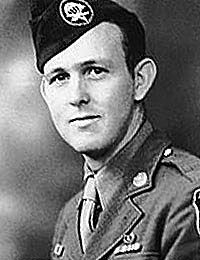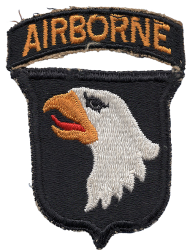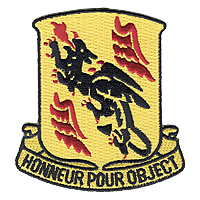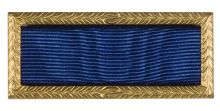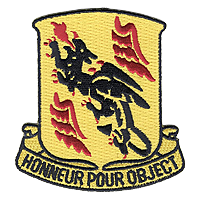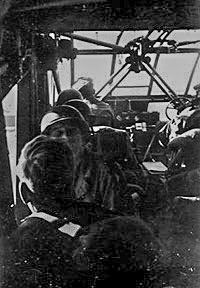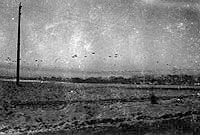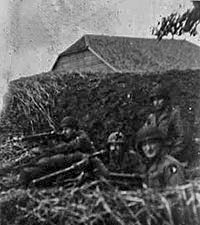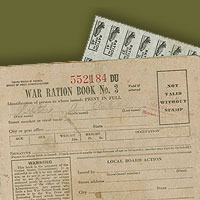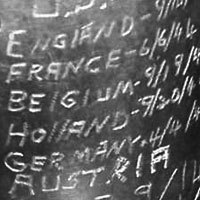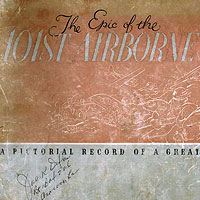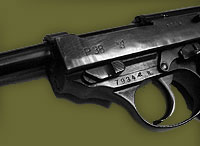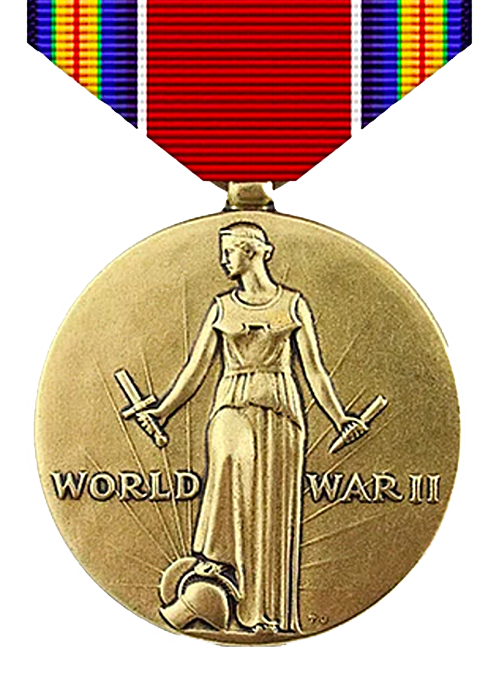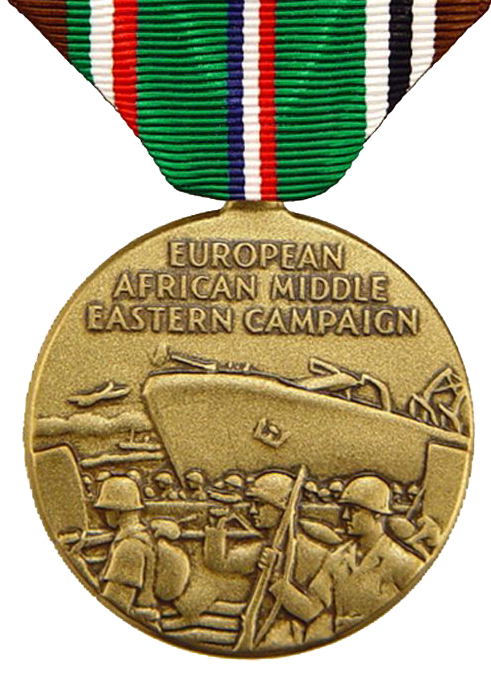On Friday March 13, 1942 I was inducted into the army at Camp Beauregard, LA. This was an old army camp built in World War One. The barracks were single story with dirt floors covered with sawdust. It was equipped with army folding cots, each with two blankets. The only thing good about it was that we did not have to sweep or mop the floor.
We were issued our clothes, dog tags and sent to get our hair cut. That night a soldier with some stripes on his shirt sleeve came in and told us all to report to the mess hall at 3 a.m. the next morning for K.P. duty. I soon learned that he was a Sgt. That was the first of many times that I was chosen for that honor. The next morning at 2:45 a.m. we were awakened and told to assemble outside for roll call. I learned that morning that when your name was called that you did not say "here" or "present" you just yelled "ho". You could get the job done much quicker that way.
In the spring of 1943 we put our training to the test with a ten day maneuver in South Carolina. That was an exciting time. We loaded our equipment into the glider at Fort Bragg. Soon we were airborne and on our way to South Carolina. We landed in the vicinity of Lumberton, South Carolina in a corn field. Corn stalks came up through the floor of the glider along with a lot of dirt. It was a very exciting landing. Very little sleep or rest did we get those ten days.
Our camp in England was in a wooded area which made it nice, but worst of all our bath house and latrine was about one hundred yards from our barracks. Pangborne was a small town and our camp was on the west side of town. There was a pub just outside of the camp. We went there often and drank and pitched darts. Pub was short for public place. The English would bring their whole family to the pub. That was where they did their visiting and socializing. We all got pretty good at pitching darts.
I tried out for the division basketball team and made the team. We went all over playing ball. One night we were playing in Reading, England and I was having a good game. I noticed from up in the stands someone kept yelling "come on brother - good going brother". (In high school Georgia called me Brother). I just knew that the one doing the yelling had to be someone from home. After the game the two came down to court side. It was Wilkie and Edwin Stephens from Hornbeck. That was a wonderful surprise. It was things like that which would keep you going. I was special service NCO for my unit and once a week if we were not out on a maneuver I would take a jeep and go into Reading and pick up things for the men. I would take all day for this. I would usually eat some fish and chips for lunch. This was a big deal in England. You usually found a fish and chips joint stuck in a hole in the wall. You ordered your fish and chips and they wrapped them in a piece of newspaper and you ate it walking down the street.
I don't believe I saw a good movie while I was in England. I was never able to catch on to what they said because of the accent and their sense of humor left something to be desired as far as I am concerned. There were plenty of USO dances to go to and lots of historical things to see.
One day at mail call I received a letter from a boy from home who I knew was also in England. I looked at the postmark and saw it was mailed the day before. (Of course his location was not made known for security reasons.) I got so excited for I knew we must be close. I wrote him back and told him I would meet him in London or Reading at the USO. I soon got a reply saying he could meet me in Oxford. I got a weekend pass and met him at Oxford. Kendrick Evans was his name. He and I were really good friends. A couple of years before we went into the service we were together most of our free time. He was in the Air force and was killed in France in a plane crash.
Bobbie Cain, a boy I grew up with and was like a brother to me, was also killed. I got to see him in England. Some of the boys in my battery was sent to Westchester to get a camp ready for the 9th Infantry Division to move into. They were coming in from Sicily. Two of the boys lived in my barracks. One night I happened to hear them talking and they named the unit they had cleaned up for. It was the 60th Battalion of the 9th Infantry Division. This division had been in training at Fort Bragg, North Carolina and they were sent to Africa and my 101st Division moved into their barracks. This was the division that Bobbie was in. That very weekend I got a pass and went to try to find him. When I got to the camp and found the unit he was in they told me they had a Bobbie Cain and I would find him at the guard house because he was on guard duty. He was off duty and was asleep. I woke him up and I will never forget the look on his face when he saw me. He started to grin and I noticed he had one upper front tooth missing. I will never forget that look. I was not with him but a few hours. He told me what a hard time he had in Africa and Sicily and he knew he had to make the invasion of France and that he would never see home again. He was killed nine days before the war was over. His body was sent back home and is buried at Holly Grove Cemetery, Anacoco, La.
It was the last of May, 1944 when we left Pangborne for the port of embarkation. We were there for almost a week being briefed, studying maps and checking equipment. There was a big tent which was used for briefing and at night they showed movies. There were no seats so we sat on the ground or on our helmet. One time as I started to sit down my helmet rolled out from under me and I fell backward into another soldier. I said "I'm sorry". It was dark as could be in the tent. In a few seconds he poked me in the back and said "Aren't you Kennith Dixon?" I said "I sure am but how could you tell because it is so dark in here?" He said "I recognized your voice". It was a Guinn boy from Hornbeck. He was a mess Sgt. over one of the mess halls. After the show he took me down to the mess hall and fried each of us a chicken. It was so good to see and to talk to someone from home.
On the 4th of June we went on board the ship that would take us to Normandy, France. (We had trained all of this time to go into combat by glider. A couple of months before D-day they sent us to Blackpoole, England and gave us some amphibious training and sent us in by boat.) D-day was supposed to have been the 5th of June but due to a storm the weather was so bad they moved it up a day. We were on this ship until we were close to Normandy and then we went down rope ladders into a small boat that was to take us on in. About two hours before "H" hour the bombers started flying over and dropping their bombs on the German gun positions. This went on until the men began to go ashore. The big Navy guns were also firing. All the bombing and strafing by the fighter planes was before daylight. There will never be another display of fireworks like that was. "H" hour was at 6:30 a.m. "H" hour was the time set for the first wave of men to hit the beach.
My unit was to hit the beach "H" hour plus seven minutes. About 200 yards off shore the boat I was in was hit by a German 88 shell which cut the cable that held the gate up and it dropped down into the water. Two of my crew and I were standing by the gun ready to pick it up and take it off the boat onto the shore. The 88 shell went through the boat killing five men. It blew them all to pieces and I was so close to them I was wiping blood and flesh off of my face and out of my eyes. Another boat pulled up beside us to pick up the three men who were operating our boat. Our lieutenant told them to get us off before the boat sank and to take us ashore. He refused and when he did someone pulled his gun and told him if he did not get us ashore that he would not live to tell about it. We got on the boat but he did not take us all the way in. Finally when we got on the beach German shells were exploding everywhere. There was a concrete wall running up and down the beach. It was about 6 feet high. Everyone was trying to get to the wall for protection from incoming fire. I finally made it to the wall and just sat there for awhile. Soon all of my group got together and we set the gun up just over the wall. We had 50 caliber machine guns and our mission was to fire at enemy aircraft. By this time the 4th Infantry had broke through and with their tanks had begun to advance inland.
More and more men, tanks, trucks and every piece of equipment you can think of was coming ashore. By mid afternoon the beach was covered with equipment. You could hear the big gun on the battleships firing at targets further inland. We soon realized that the enemy did not have the aircraft to send over Normandy. The allies had the sky full of fighter planes. However, late that afternoon three German planes did come down over the beach strafing and did drop some bombs. They met a wall of fire that took them out of action. Just before dark I saw my first group of German prisoners. I was standing in my gun emplacement and looking up the beach and there was about seventy-five being marched four abreast by several MP's. To me that was a pretty sight. As they got closer I saw that there was one woman in the group. Just as they got in front of my gun position the MP's turned them out into the water. They were taking them out to an LST boat and I guess back to England. As they got out in the water and it began to get deeper the woman started pulling her dress up to keep it from getting wet. She soon realized that was useless. I stood there thinking that they did not look like the master race now.
From my position on the beach I was able to see most of Utah Beach. All day the army combat engineers were working to clear the beach of obstacles and to blow up mines and blow gaps in the wall so men and equipment could get off the beach. They seemed to be oblivious to all the shelling around them. D-day finally came to an end with us holding a small part of Normandy and we had paid one hell of a price for it. I was on the beach six days and from there we were moved inland to protect a bridge so the Germans could not destroy it. We moved into this position and saw that there had been some hard fighting going on there. We saw dead Germans and Americans still lying there. We got our gun set up and in no time here came a truck load of Germans racing toward the bridge. There was eight of our 50 caliber guns set up by this time and whatever they were up to we stopped it. We all liked to think we saved the bridge. Still we saw no German aircraft. We saw no further action at this location. We were moved several times the next three weeks. Most of the time still being used to protect bridges or set up at crossroads.
We had gone all this time without a full length bath. After thirty days they put up a shower with hot water and when we got under that it was hard to get us out. Boy that felt good. The next day we learned that we were being sent back to England. That meant both the 101st and 82nd Airborne. We had been in France thirty-three days. We were taken back to Utah beach and put on LST boats and was soon back at our base in Pangborne. We spent a few days getting our guns, clothes and ourselves cleaned up. Word came down that the whole division was being given leave time. We could not believe this. Four of us left camp and went to Liverpool, England. We were the first soldiers to be back from the fighting except the wounded. It was a wonderful feeling to walk on the streets, go to the movies and into the pubs and not worry about being shot at. Still you could not help thinking about going back into action. Leave was soon over and we were back in camp getting ready for our next call. The news from France was mostly good. The allies were advancing on all fronts and General Patton and the 4th Armored Division was on the move.
On about the 12th of August we were sent back to France for a mission and by the time we got there Patton had overrun our target so were sent back to England. The same thing happened the second time. Back in England we began to think and to hope that we might make it through the war riding LST's back and forth across the English Channel. But the third call was for real. Operation Market Garden it was called. We were to go into Holland and seize a series of bridges over river and canal lines allowing the main allied ground forces to continue their advance into Germany. The 101st Division was to take and secure the bridges over the Maas River and the Wall River at Nijmegen. The 82nd Airborne was to secure bridges and canals north of Eindhoven at Veghel and Son.
The British 1st Airborne had the farthest bridge at Arnhem. The objectives of both the 82nd and 101st were taken on. The first two days all of the bridges were taken intact. Now it was left up to the men of the Airborne divisions to hold this ground until the British army could get to them. The Germans were believed to be very weak in and around the Arnhem area. The exact opposite was the case. There was two Panzer divisions refitting in the Arnhem area. By the time the British broke through to them they were almost annihilated. We had fifty miles of highway and bridges to protect. The Germans had gotten over their surprise and were starting to counter attack aimed at the bridges. They cut the road twice in the sector I was in. Each time we drove them back. Holland was a bloody battleground. General Montgomery had run into stiff resistance and was not advancing as fast as expected. This meant that supplies had to be dropped by air.
My battalion was moved to a small town near Nijmegen, Holland where we relieved a group of British soldiers. There was a railroad running east and west by this town. On the south side of the track there was a canal. Between the track and the canal was the road leading into town. This was the only road into town. Where the road made a sharp right turn and crossed the track there was a small building used as a railroad station. On the north side of the track was the town. On the north side was another canal. The British soldiers told us that on the other side of this canal the Germans that was holding this territory was a group of old men and boys and they did not want to fight. The British were going around without their guns and not even wearing a helmet. I was sent to the north side of the village and told to find a two story building and to mount the 50 caliber machine gun on the second floor. The purpose of this was so that we could fire across the canal into the German positions. We were to fire several rounds at different times just as harassing fire.
Our ammo was for use against aircraft. It had armored piercing, incendiary and tracer shells. It was not intended for use against foot soldiers, but they were using us now as regular infantry. The second day we were at this village about one hour before daylight. Those old Germans that did not want to fight began to throw heavy stuff at us. Shells were exploding everywhere. The heavy shelling went on for over an hour. We knew as soon as it stopped they would attack in force. We were spread out very thin and things did not look too good. It was about 10 o 'clock when my Sgt. came into the building and told us to get out and take as little as possible. We left our 50 caliber gun after rendering it useless and took off. The Sgt. had told us to try to make it to the railroad station and there would be others there waiting for us. A short distance from the railroad station by a house seven of our boys were there with a jeep and trailer. We all loaded into the jeep and trailer. The only way out was by this one road or swim the canal. The Germans were sweeping this railroad crossing with machine gun fire. We saw that the machine gun would stop firing to reload and we timed how long it took to do this. The driver of the jeep had the motor racing and when the Sgt. said "Go" off we went. We had to make a sharp left turn after we got across the railroad and I thought the trailer would turn over but we made it. I decided after it was over the jeep we were in was the slowest one the army had.
We drew back some distance and regrouped. We learned later that if it had not been for two of our men inside that railroad station firing their 50 caliber gun up the railroad we may not have made it out. In a day or two the 101st retook the village. During the fighting two of our men were dug in by a wood pile. One of them was named Zebert and the other was Hickey. Zebert was the oldest man in our battery. He had no family and was raised as an orphan; he never got any mail; he made Hickey the beneficiary of his army insurance. They were real buddies. Hickey was a professional gambler in civilian life and the two of them gambled together all of the time. Things did not look good for them while at this woodpile and Zebert told Hickey that it looked to him like the worst was about to happen. He said "I am going to ask you something and I believe you will tell me the truth." He said "Did you ever cheat on me when we were gambling together?" Hickey said "Yes, all the time". Zebert made it out with the rest of us but Hickey was captured. We were still in the position that we had pulled back to when someone looked up the road and saw a soldier coming toward us and said I believe that is Hickey coming this way. In just a minute or two we all knew it was him. Zebert really got excited and said let me get to him and I'll kill the cheating so and so. When he got to him his arms went around him and the two of them just stood there. It was a happy time for all of us to know that he had managed to escape.
We were sent up to the Nede-Rign River and there we were in a holding position. By this time the fighting had passed us by. We had been in Holland 73 days. They loaded the 101st and 82nd Divisions into trucks and we left Holland. The 101st was sent to Mourmelon-Le-Grand, a camp near Rheims, France. We were there just a short time and had not had time to get replacements or get ourselves or our equipment ready for another engagement.
On the 17th of December we were awakened during the night and told to get our battle gear ready to move out. In a short time we were on our way to what turned out to be Bastogne, Belgium. It was a cold and rainy night and just the first of many we were to spend. There was a shortage of everything. We were given a few rounds of ammunition after we arrived in Bastogne. Bastogne was a very important road junction and must be held at all costs. We did not know the scope of our mission until we arrived in the town. We learned that Germany was putting everything that they had into a drive to break through the allied lines and split the allied forces into. Then they would have an open path to the Belgian port of Antwerp. This would have prolonged the war another year. My battery was sent into the center of town with our 50 caliber AA guns to help protect the division headquarters. My gun position was on the south side of a row of two story buildings. The weather turned really bad and had started snowing. The first night German planes came over bombing and strafing the village.
The second night they were back. The first night we were firing at them so the second night I guess they knew we were there. A bomb landed close to my gun position and a piece of shrapnel hit the breach of the gun and put it out of action (there was two of us on the gun at all times). We were lucky one more time. On the 22nd of December Bastogne was almost surrounded. On the 23rd of December we were completely surrounded. The weather was still very bad and it was still snowing. Bastogne was taking a terrible pounding from heavy artillery. On the 24th of December they moved my battalion to the southern edge of Bastogne to help cover one of the main roads leading into town. It was 10 o'clock at night when we got the order to move. We dug our gun emplacement and finished about one hour before daylight. We had set up beside an old barn. It was a small building. I put two men on the opposite side and three men inside the barn. There was two of us on the 50 caliber gun. The other men were armed with M1 rifles.
The morning of the 24th the weather had cleared. The sun came out and so did the allied fighter planes. Then came the C47 cargo planes dropping supplies. It was a sight to behold. Those fighter planes really played havoc with German tanks and their transportation. After the supply drop we felt better for we now had ammunition and a fresh supply of rations. It was 8 o'clock on Christmas morning and I had just finished eating my K ration when all hell broke loose. They were shelling us with mortar fire and everything else they had. This went on for about twenty minutes. As soon as this stopped the Germans came out of the woods in front of us. (We were covering an open field some 500 yards deep and about that wide). They were wearing white snow suits. As soon as I saw them I yelled, "Here they come." I saw very quick that the man with me on the gun was not going to fire so I shoved him away from the gun and opened fire.
There was two more 50 caliber guns between me and the road and by the time I started firing they had opened fire. The Germans had advanced about half way across the field but when we hit them with all we had and they were dropping like flies they withdrew. Still they tried twice before noon to take us. After that it was quiet. Later I asked the man on the gun what happened to him (I was thinking that he just froze). He said he was waiting for them to get closer. I said, " Hell man, they were already too close for me." That was some Christmas morning. I have never cared for fireworks since then.
Early on the morning of the 26th we heard someone yell, "Hey 101st stick your head up and be recognized." They yelled this about three times then some soldier down by the road yelled back, "To hell with you, you stick yours up and be recognized." It was the advance guard of the 4th Armored Division. We had been looking for them for three days. Soon tanks and men were pouring into town.
It was on the 22nd of December when three German soldiers had come to our lines under a white flag and told the men they had a message for the Commanding General. The American GI took it to General McAuliffe and it read: "We have you completely surrounded and you will be annihilated if you do not surrender. General McAuliffe's reply was just one word, "Nuts". A division of men that went into combat at 3/4 strength and after seventy-three days of hard fighting and no rest we beat the best that Germany had to offer. We became known as the "Battered Bastards of Bastogne". The people of Bastogne were coming out of every nook and corner to celebrate.
We left out of Bastogne at night in a real snow storm. This was on the 19th of January when we moved into a reassembly area. Soon we were alerted for movement on to another mission on the front in Alsace-Lorraine. The quiet of the countryside was welcome after the Belgian campaign. At this location we were quartered indoors. Some of us were put in private homes. A boy by the name of Mitchel and I were together in a house with a lady and her son who was eight or nine years old; also the lady's mother lived with her.
We were in a defensive position in Haguenan on the Moder River. We would rotate our days on the front lines; on for four days and off four. The four days we were off there would be some nights we would be sent on patrols. This was no fun either. The Moder River ran through the center of Haguenau. The Germans held the north bank. Except for patrol activity and occasional heavy shelling of the town things were relative quiet. The days we were on the front line we ate our box rations. There was a chocolate bar in each one. Mitchel and I saved these to give to the little boy. He had never seen chocolate. The day we were to leave the mother gave us a cake that she had made with some of the chocolate bars.
After 31 days in Haguenau we were sent back to Mourmelon, France. There we rested and trained and enjoyed the peace and quiet. It was there that we were awarded the Presidential Unit Citation by President Eisenhower. It was the first time in the history of the American army that an entire division was given the citation. It is recorded that special planes were chartered to bring in correspondents from Europe to record the ceremony. The citation was given to the 101st for its gallant defense of Bastogne, Belgium.
On March 24th we watched as the 17th Airborne Division flew over headed for the drop zone over the Rhine. A few days later in early April we boarded trucks and headed for the Ruhr valley. Our mission was to contain the western flank of the Rhur pocket from the west bank of the Rhine. This again was a line of static defense. It made for more long nights standing on guard waiting and hoping that nothing happens. Our army was now in Germany and moving fast. Of course we did not get a daily paper and did not know what was going on except in our location. We just knew to keep our boots on and when someone told us to move we just asked, "Which way?" We were moving so much now that we just knew the end must be near.
In late April we moved from the Rhur and started on a chase that took us through southern Germany and into the Bavarian Alps and into Austria. The Germans, with no will to fight, were giving up by the thousands. Sometime we saw long columns marching down the road without a guard going to a prisoner of war camp.
We were on our way to Ulm, Germany when we saw a jeep with an officer standing up in it yelling that Germany had surrendered. We all went crazy. We wound up in Austria on top of a mountain in a big ski lodge. The war in Europe was over and here we were able to get three hot meals a day and more or less do as we pleased. This was the first of July. I have picture of me on a white horse and it was snowing on the fourth of July. Our mission there was to look for enemy soldiers hiding out in the mountains. You know we were really concerned with those poor ba----ds. Still today I believe someone was pulling our leg. We had a good time playing in the snow, riding horses and just enjoying the mountains.
It was the 101st Division along with the French army that captured Berchtesgaden, sight of the summer homes of the German general staff and Hitler’s Eagles Nest. I got a four day pass and went to Berchtesgaden and saw the Eagles Nest. It was located on top of the highest mountain there. It took 3,000 men (prisoners) three years to build the road up the mountain to it. You could look out the big wide picture window in a large meeting room and see a big lake way down below. It was a very beautiful sight. Down by the lake there was everything you can imagine there for the Germans to enjoy. Of course the U.S. army had taken this over and made it a rest area for the GI's. German prisoners were doing the work. One day while I as having dinner the waitress, who spoke perfect English, said, "I strafed and bombed you guy's at Bastogne." She had been a fighter pilot. We were moved from the ski lodge up on the mountain to a village down below. The fighting was over and we were an occupational force.
There were rumors always circulating. We were very much concerned about rumors that we would be sent back to the states, given a short furlough, return to our home base, then we would go to Japan. That thought made for lots of lost sleep. In just a short time the U.S. dropped the atomic bomb in Japan. On the 14th day of August, 1945 Japan surrendered, ending World War II. We knew then that we were home free.
The priority for going back to the states depended on the point system. The soldiers with the most points could go first. The points were based upon the number of battles they were in, the decorations received and so forth. I was short five points having the required seventy-five. In a short time the whole division was given a citation and that put me over the limit. The high point men were loaded on trucks one morning and we said goodbye. The men we left behind were all new to our battery. Our battery commander came up to the truck I was on and said, "Joe, won't you change your mind and stay with me a little longer?" He had called me into his office a few days before and asked me if I would stay as his first sergeant. I said, "Captain Joe I would not stay if you gave me two bars."
We were sent to a camp in Marseille, France to wait for the ship to take us to the U.S.A. One night one of the sergeants (I did not know him) went into town, got drunk, got in a fight and beat up a Frenchman really bad. The General had everyone assembled. He gave quite a lecture and ended up saying, "If anything else happens in the way of misconduct by any soldier in this group, I will personally see that it will be some time before any of you get to go home."
Finally we got on the ship and started for the U.S.A. The weather was nice, the Atlantic was just a ripple. When we sailed into Boston Harbor it was on the 14th of September, 1945. Small boats of all kinds loaded with people came out to meet us. It was an impressive sight. At meal time they had so many different things to eat it was hard to decide what to eat.
We stood in line for everything. It took me a long time to finally send a wire to Mom and Dad letting them know that I was in the states. I also sent one to Clell in South Carolina. I learned later that in the rush and excitement I had sent both wires to South Carolina. As it happened Andy received both of them because Clell was already in Anacoco to wait for my homecoming. Apparently Andy then notified the family in Anacoco by telegram since they had no phone.
We were soon put on a train that would take all of us from the south to Camp Shelby, Mississippi. It was a long train ride. Things moved fast at Shelby and soon I had my discharge in my hand. From Shelby six of us got a taxi to New Orleans. This taxi took us half way and met another which took us to New Orleans. From there I took a train to Lake Charles, Louisiana where I had to wait for hours for a bus on to Anacoco. It was 2:30 a.m. when I arrived in Leesville. It was so early in the morning I didn't want to wake Mom and Dad at that time of night. I decided not to ride the bus on to Anacoco. I left my bag at the bus station and walked up Third Street to pass some time. I walked up and down the street looking in the store windows.
There was not anyone else to be seen. I went back to the station and tried to sleep. Finally, about 4:00 a.m. I got a taxi to take me home. The closer I got to Anacoco the more nervous I got. When we arrived at the house I got out of the taxi, paid the driver and started in when the door burst open and out they came; Clell with Virginia Ann, Georgia, Brenda, Louise and of course Mom and Dad. It was hard for me to realize that I was at home. The next morning at breakfast when grace was said and I looked around the table at all of my family I knew for sure that I was at home. What a wonderful homecoming it was, thanks be to God.
Joe Kennith Dixon
